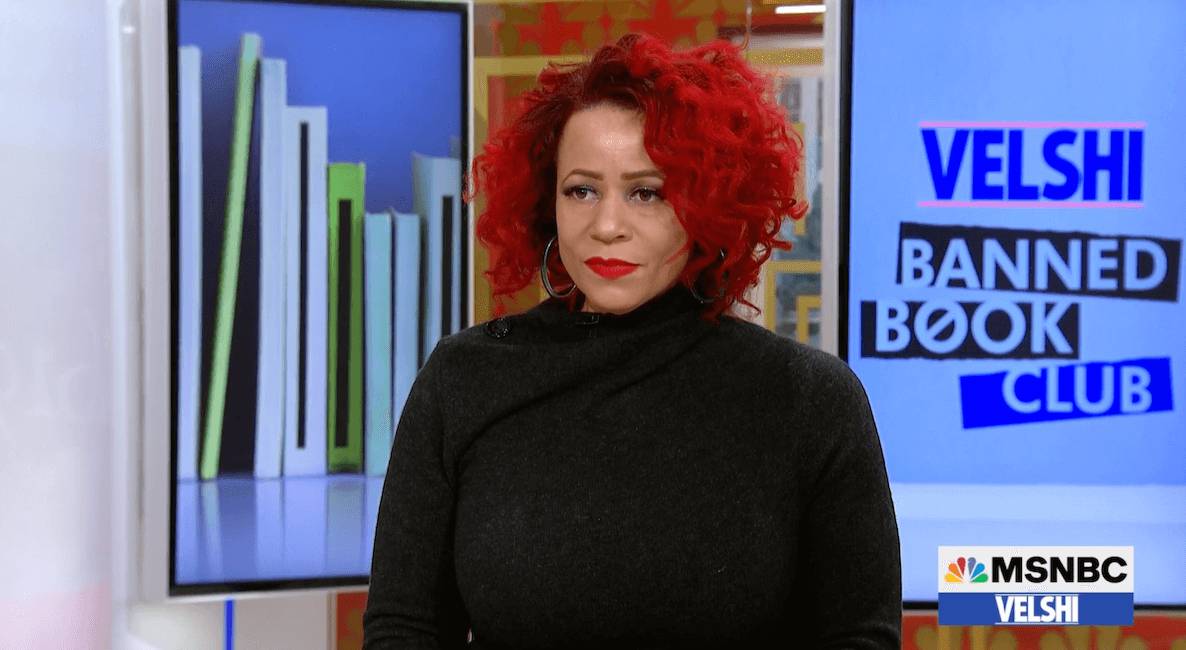For the first anniversary of the #VelshiBannedBookClub, Ali Velshi invites back Nikole Hannah-Jones, author of much-banned The 1619 Project — and the original inspiration for and inaugural guest of Velshi’s Banned Book Club. Hannah-Jones explains how, four years later, her New York Times project-turned-book-turned cultural moment has shaped conversation about race and education in America.
The below questions are paraphrased versions of Velshi’s.
What did banning do to The 1619 Project?
“The more they talk about it, it actually helps spread the message. I wanted us to know the date 1619, to take it out of obscurity — and certainly it’s not an obscure date anymore.”
What role has debate played in the banning of your book?
“The 1619 Project is making an argument. It’s making an argument about American history, about American origins, about the role of slavery and its legacy. And you can agree with the argument or disagree with the argument.”
“There’s certainly valid critique of any ambitious project. But that’s not what we’re talking about.
To say: I disagree. I wouldn’t say it that way is different from saying: Kids shouldn’t be exposed to this. These ideas don’t even belong in the classroom. We should try to ban these books.”
And that has become couched in this other misrepresentation: critical race theory.
“We should just call the anti-critical race theory campaign what it is. It’s a propaganda campaign. It was stoking division for political gain, because obviously, both critical race theory — the actual critical race theory — and The 1619 Project are not talking about individuals. They are talking about systems.”
“So it’s not saying any child or any person is responsible for things he or she didn’t do. It’s says that we were built on a system of anti-Blackness and racism. And those structures are structured into our society.”
You’ve said this stuff is supposed to make you uncomfortable, to introduce you to a world you didn’t know.
“Absolutely. The books that have stuck with me the most through my life are those that have unsettled me, those that have challenged my worldview, that made my mind have to work in a different way. This is how we gain empathy. This is how we gain enlightenment. This is the purpose of an education.”
“None of us should be sending our children to school simply to have their worldview affirmed in every way. They should be challenged.”
And when we talk about a shameful past, it’s OK to feel ashamed by that. It doesn’t mean you have to feel guilt … Countries do great things and countries do terrible things, and we have to deal with it all.”
What about Born on the Water, your children’s version of The 1619 Project?
“In some ways, it’s a very patriotic book in the same way that The 1619 Project is very unintentionally patriotic — because what it argues, despite what critics say, is that Black people have believed in this country despite everything this country has done to Black people.”
Where have the last few years of criticizing and banning left you?
“I am stronger. What I understand is you don’t see these types of efforts against this book or any other books that have been banned if they’re not having impact. They’re not banning books that no one cares about.”
Listen to Ali’s interview with Nikole Hannah-Jones:
Velshi and Nikole Hannah-Jones on banned books:
Velshi on banned books on MSNBC:
![]() MORE ON BANNED BOOKS FROM THE CITIZEN
MORE ON BANNED BOOKS FROM THE CITIZEN



